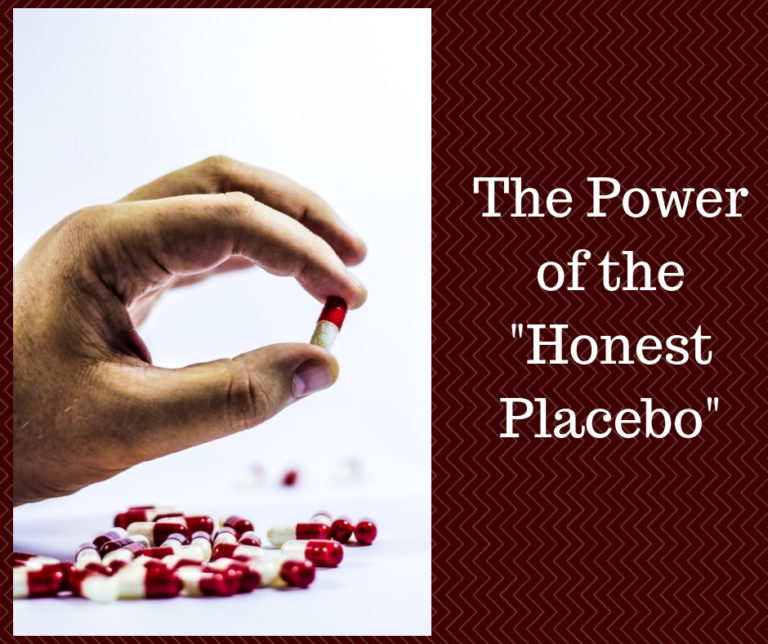Recently, an article was published in TIME magazine that describes current research into the potential positive effects of placebo medications. It’s likely that you’ve heard of the “Placebo Effect” – a phenomenon by which sometimes patients respond to a “fake” treatment, such as a medication that does not contain any active ingredient. During clinical trials, it is common to test medication by giving some volunteer patients an active drug and giving others a placebo, without telling the participants which one they were given. During these trials it has been found that a placebo medication can sometimes result in a positive response, such as improvement in symptoms. Other times placebo pills can produce negative reactions in patients – such as the experience of one or more of the negative side-effects that a “real” medication might have. It is common to compare placebos to treatments to determine how effective or useful a particular medication might be for a particular condition or type of patient.
The fact that “fake” treatments can produce actual physical effects demonstrates that there is a relationship between the human mind and body that affects the way that people respond to treatments. Wouldn’t it be cool if we learned to better tap into that relationship?
Medical researchers are currently studying whether placebos can produce positive results even when patients are aware that they are being treated with “sham” medications. Such pills are called “Honest Placebos”. It is fascinating to learn that the results of some of these studies are showing that even when patients are aware that they are taking a placebo, they are often reporting improvement in symptoms! In one study for example, 59% of patients with Irritable Bowel Syndrome (IBS) reported relief of symptoms after taking honest placebos. According to WebMD, placebos have also been found to have an effect on some mood and sleep disorders, symptoms associated with menopause, various types of headaches, and also on generalized pain.
Several theories attempt to makes sense of these results. Placebo treatments may be activating neurotransmitters in the brain that play a role in the body’s response to pain and discomfort. Taking a placebo may enable patients to approach their situations with positive expectations and hopefulness, which then may allow the body’s natural response to illness or injury to proceed in a more efficient manner. Taking a placebo may be giving the patient the sense that they have some control over their situation and that, combined with the knowledge that they are actively “doing something” may be the catalyst creating an environment where physical healing can occur.
In today’s Western medical environment and fast-paced, high-tech society, it is not uncommon for patients / health care consumers to feel that their well-being is getting lost in the shuffle of high copayments and coverage premiums, the rushed or limited access to health care providers, restrictive insurance regulations, and the system’s overreliance on treatments with “quick-fix” procedures and gimmicky gadgets that aim to put Band-Aids on symptoms rather than address the underlying causes of injury, disease, and pain. According to the TIME article, only 34% of Americans have “great confidence” in the country’s medical-industry leaders. This is a significant negative shift from times past: in 1966, a much more significant 73% of us reported trust in their medical providers.
Wouldn’t it be interesting, then, if honest placebos might be utilized in conjunction with a better-designed medical experience – one that provides the caring, empathetic consideration of each patient’s individual physical and emotional / intellectual status and then a thoughtful opinion based on clearly conveyed clinical expertise? More effectively harnessing the power of the mind and brain could have dramatic effects on health and wellness. I hope that we collectively figure out more and better ways by which to make this happen.
Physical therapists do not traditionally prescribe medication – with or without active pharmaceutical ingredients. Physical therapists do, however, base their clinical practice on teaching patients how to “do something” to positively affect their physical function. One of the reasons that I chose physical therapy as a profession instead of going to medical school is because it was (& still is) fascinating to me to figure out how to help people attain and maintain health by using my hands and the body’s ability to move as primary tools. Simple. But also such a challenge. Physical therapists also get to spend lots of time with their patients – a true luxury in today’s Western medical society. I get to use 60 minutes at a time to collaborate with a patient: to listen to questions and concerns, learn about each individual’s life situation and goals, and actually try out and work through a treatment plan together. I then get to check in with each patient periodically on their path of recovery, rather than making recommendations that may or may not be actualized when a patient walks out of the clinic – potentially never to return unless a new illness, injury, or calamity arises. This practice pattern allows for the development of a human relationship and a team approach to health. How does this compare to an Honest Placebo? I don’t know for certain, but I would be intrigued to work out a study.
If you are interested in reading the TIME article in its entirety – check out this link. And if you are interested in giving physical therapy a try instead of medication or an honest placebo for illness, injury, or impaired physical function, we hope that you’ll give Symmetry a call. We’d be happy to help you to harness your own power to attain optimal health!

